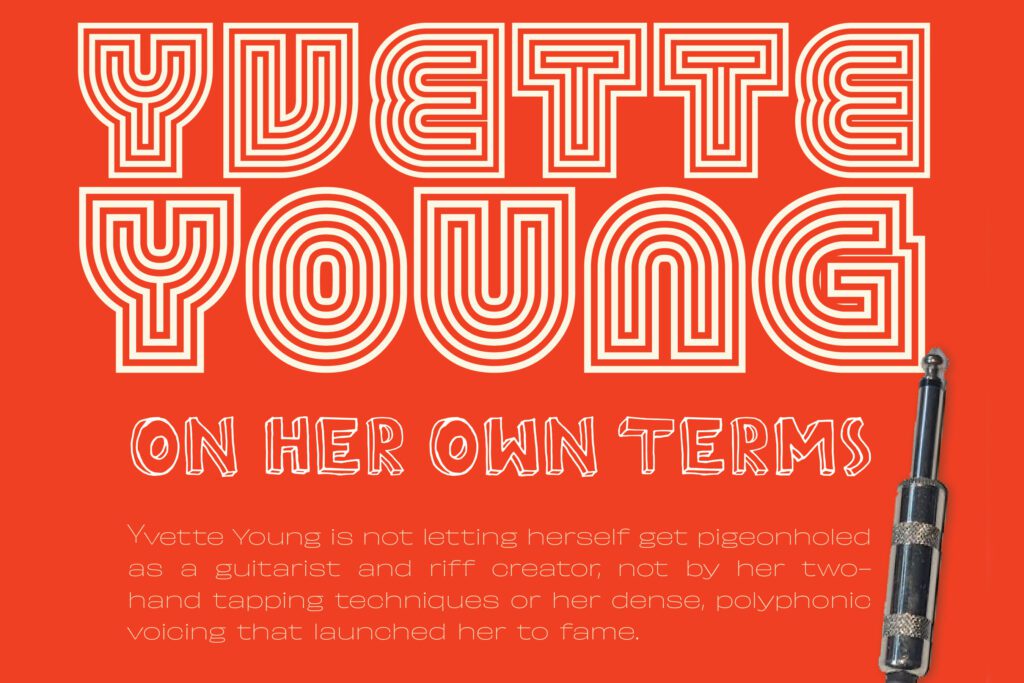
“I think instrumental music is the most compassionate form of music, because it listens to what you’re feeling instead of telling you how to feel.”
As a teen, Yvette Young dreamed of being in a band. But while studying performing arts education and fine arts at UCLA, she dreamed of showcasing work in a gallery. During the day, Yvette taught afterschool art classes in Cupertino and Sunnyvale, and for a short while even did tattoos.
Ironically, art school taught her to break the rules. During peer critiques, she and her classmates trained to stand in front of the class and explain the choices in their paintings. “I learned that nobody can argue with ‘because I wanted to,’ ” she says. “There’s so many resources out there telling you the right way to do something, but at the end of the day, it’s okay to do something you want to do because you want to.”
Eventually, this would guide her through the darkest tunnels in the music industry. But first, she fortified others as they asserted their own voices. As a portfolio coach helping high schoolers apply to art school, she often found herself asking them: “Cool, I know your mom wants you to go to Stanford, but what do you want to do? It’s not your mom’s life, it’s yours.”
Yvette understood the battles they were facing. In her childhood, on top of achieving perfect grades at school, she prepped for piano competitions up to four hours a day—unsupervised. No sleepovers, and no shows. Thankfully, there was MySpace, and Yvette found local bands online. She snuck out to shows and made friends there. But at sixteen, buckling under the intense pressure to compete, Yvette developed an eating disorder and got pulled out of school.
While in the hospital, her parents bought her a guitar. “I’m so thankful to them for that,” she says. Though her upbringing was relentlessly driven by her parents’ dream to raise a classical prodigy, Yvette appreciates that her parents introduced her to different forms of art. “I think the best thing you can do is to expose your kid to a lot of different art forms, and then teach them that they are autonomous,” she shares.
As Yvette taught herself to play acoustic guitar, her own music took shape—intricate and meditative, but also “angular and surprising.” She delighted in the way it amplified anything she felt. “Lyrics are good at telling you how to feel, right? It dictates the mood of the song in general,” she says. “But I think instrumental music is the most compassionate form of music. It listens to what you’re feeling instead of telling you how to feel.”
She also wanted to subvert stereotypes. “I kind of detested the thought that people would hear my gender through my music.” At the time, witnessing a tendency for women to be written off as singers, Yvette didn’t want to be pocketed into a singer-songwriter genre like “coffee shop core.”
In early 2014, Yvette released her first EP Acoustics. Still an art teacher living in San Jose, she started a band with friends—the first iteration of Covet. With her virtuosic style in the spotlight, Covet grew to prominence in the math rock scene. Two years later, they were on tour. But when one of her bandmate’s behavior became erratic, Yvette had to lean on her closest friends as she navigated the hostile work environment that Covet had become for her.
“I never thought that I would have to devote my energy to a legal battle. I was like, ‘Yo, I just wanna write music.’ ” While playing at Bonnaroo, in Tennessee, she had a breakdown backstage. When she looked up, she was surprised to hear clapping. “They were like, welcome, you’ve passed the rite of passage!” she recalls. Her peers in the guitar community assured her: “Everyone goes through this once in their career. Everyone gets deceived at some point…it’s just how the industry works, unfortunately.”
Yvette took about two years to extricate herself from the situation. Instead of trashing the project, she brought in a new drummer and bassist in 2022 and plans to continue touring with them. “Covet represents a little bit of my past where I still love it to death,” she says. “Guitar riffage? Hell yeah!”
But just as playing guitar for herself—all those years ago—led her to fall back in love with piano and violin, Yvette is following her curiosity towards her present interests. “The key to staying an artist isn’t curating who you are to what people expect of you,” she says. “It’s actually supposed to be the opposite.”
Lately, Yvette’s been falling in love with music production—creating soundscapes with violin, trumpet, or cello. She’s interested in supporting a larger narrative, versus being the front person. “I can work behind the scenes and actually become even more fulfilled artistically,” she says. Between long, lazy drives to her home in the mountains and joyful afternoons creating field recordings, “I’m just trying to figure out how I can stay home more, tour a little less, and just pursue what I actually find
really fulfilling.”
yvetteyoungmusic.com
Instagram: yvetteyoung
